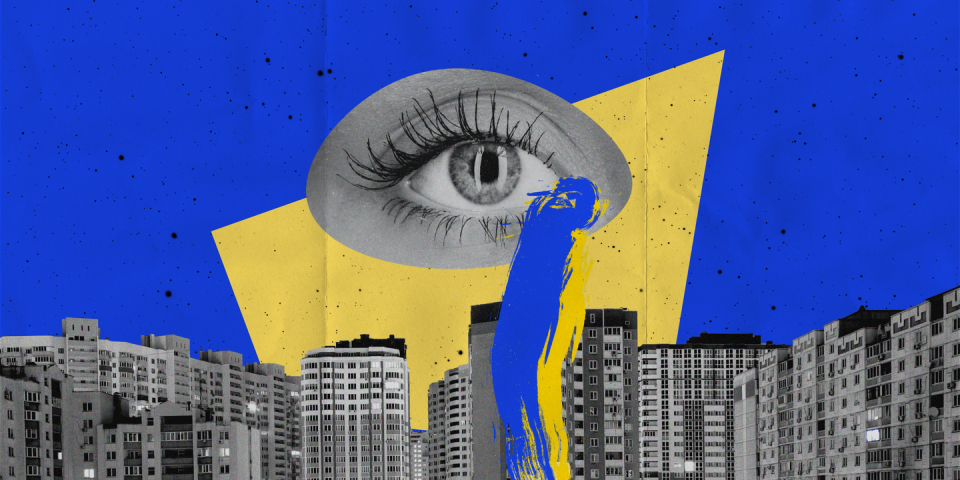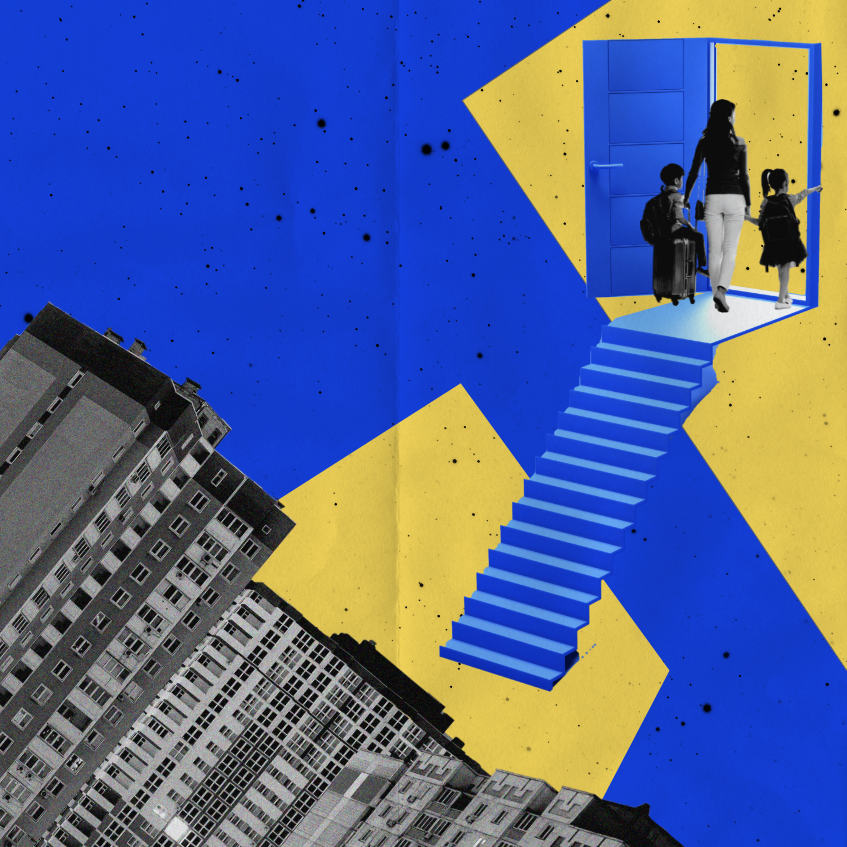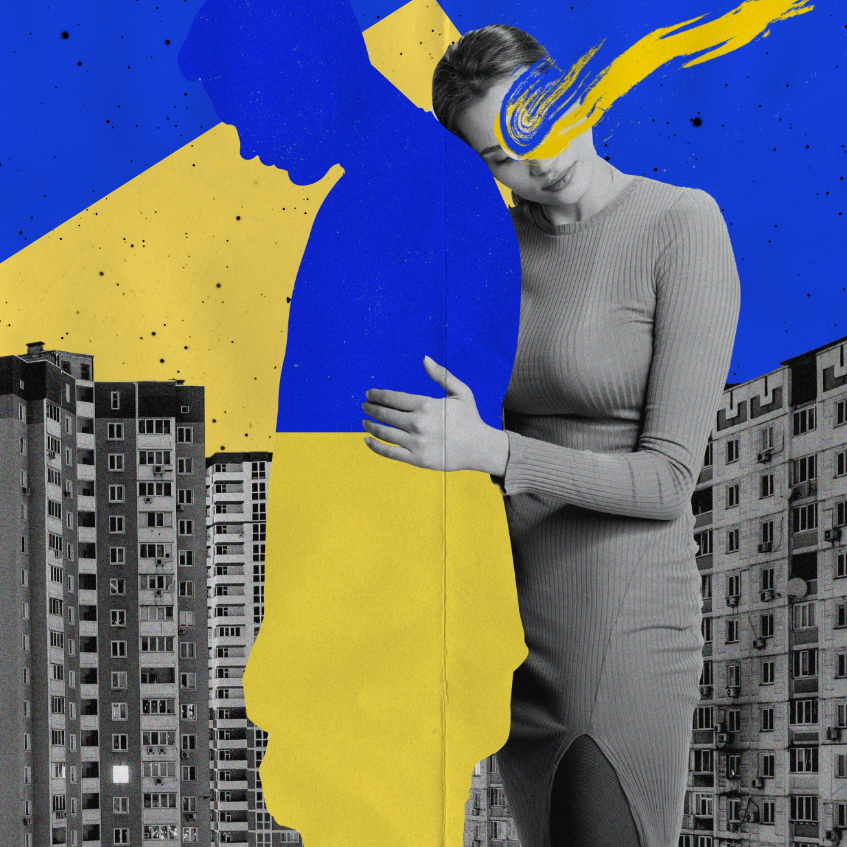"People are starting to forget – but the war in Ukraine is not over, we still need help"

On the 24 February 2022, Russian President Vladimir Putin launched a full-scale invasion of Ukraine, launching the biggest war in Europe since World War Two. Following the invasion, at least 12 million Ukrainians have been displaced, with 5 million having fled Ukraine to find refuge in neighbouring countries. Seven million are thought to have been displaced in Ukraine itself. One Ukranian woman tells Cosmopolitan UK her story.
I never thought I would have to go through this, fleeing my country to escape death. Yet here I am at the age of 36 in a home – that is not my home. It started with a call from my sister on 24 February 2022 at 6:24 am. “Olena, the war has begun,” she shouted frantically. “Take the kids and go!”
Even though we had heard Russian troops were moving towards the Ukrainian border, the invasion of Ukraine by Putin was hard to believe until it actually happened, the morning my sister rang. Myself and millions of others knew we had to get out. And fast.
I started packing our suitcases, eager to get myself and my two children, aged eight and five, out of danger’s way. My husband encouraged me to calm down, wait it out, and see what happened. I decided to heed his advice. Knowing food might become scarce, I walked, too afraid to drive, five minutes to the nearest supermarket to stock up on all the basics. Even very early in the morning, people were everywhere – long lines at the supermarket, the bank, the pharmacy.
In the days following the initial invasion, I continued working as a nail technician, earning money to save up for our impending departure from Dnipro, the city where we lived in the centre of the country. If a loud siren went off throughout the city alerting us of an imminent attack, I went into a windowless room for cover.
During the month I stayed in Ukraine after the invasion, most of my friends and family had escaped, fleeing both internally within Ukraine and to bordering countries. It was a scary time. We could often hear sirens, bombing, rockets. I tried very hard to make sure my children felt safe. They were my priority.
Following the horrific news of the deaths that happened in Irpin, during on-the-ground battles, and in Bucha (where Russian forces massacred civilians), I started to ask my husband once again to leave Ukraine. He didn’t want to leave his country, he wanted to stay and fight for it.
There was one night, I can’t quite remember the date, when I heard explosions directly over our house. We took the children into the bathroom to sleep, afraid for the night ahead. It was this that made my husband decide we had to go, but he was going to stay behind.
I filled out my visa application forms on 1 April and by 4 April, the three of us used the money I had saved to take the first leg of our journey from Dnipro to the Polish border. I packed 2 suitcases and 3 bags to take with us. Mostly clothing and shoes, but I also decided to pack all my nail supplies in the hopes of working again once we’d settled.

The journey - made mostly via train - should have taken only 20 hours, but in the end it took about 60. We kept stopping, were told to turn off our phones in case the Russians picked up our signals, and we were made to keep lights off in case they could locate us in the dark. My kids thought it was a bit like a game. I was terrified.
When we finally arrived in Poland, we stayed with a family in the small village of Zalesie Gorna, 14 miles south of Warsaw, who had signed up for a scheme to support refugees. After over a month of being stuck inside in Ukraine, my kids could finally enjoy taking walks outside and breathing in the fresh air. Even though we were technically safe, I still could not completely rest as I could hear helicopters often flying overhead toward my country, toward my husband.
After eleven days of living being in Poland, we were given our UK visas and immediately started preparing for the journey to meet our longer-term sponsor family face-to-face in Newport, Wales.
As of 9 August 2022, at least 174,200 Ukrainian visas have been issued in the UK and 111,900 Ukrainians have arrived after fleeing the Russian invasion. Of those who have made it over to the UK, 79,000 have come as part of the Ukraine Sponsorship Scheme, otherwise known as “Homes for Ukraine”. The scheme has allowed for those without relatives in the UK to come and live here for at least six months.
Coming to the UK
We boarded a train in Poland at 2am on 19 April and travelled from Zalesie Gorne to Warsaw. From Warsaw to Berlin. From Berlin to Cologne. From Cologne to Brussels. From Brussels to London. From London to Newport. Although my children napped, my eyes stayed wide awake, gazing at them, reflecting on all we had been through. At 1am, the doors of the train slid open, and we saw our sponsor, Emma*, who we had met previously on a video phone call, waiting for us. All I could think about was sleeping. That first night, I slept so deeply, knowing I was truly safe. Knowing my children were safe.
For the first few days, we just enjoyed getting to know Emma, her husband, and their three children – and their dog! Emma cooked for us at first, but then I asked if it was okay to make Ukrainian food for my children. She said I could use anything I wanted in the house, making me feel incredibly welcomed and loved, even though we were strangers.
I have since made their family some Ukrainian food – borscht and pancakes – but made sure Emma didn’t have any meat as she’s a vegetarian.
Although Emma and her family really do make me feel at home, deep down I know this is not my home until I have all my family with me. My husband and parents are still in Ukraine and I don’t know how long it will be before I see them again. I often watch the news on the TV or read it on my phone, learning about the horrors of war in my home country.

On 15 July, I read reports saying there had been rockets shot off directly behind our flats in Dnipro. I tried to phone my husband to check if he was okay, but he didn’t answer. I was physically shaking with fear, imagining something had happened to him. After an hour, he finally answered, calming me down and assuring me he was safe – that he had left his phone at home while he had been out.
In the first few weeks and months of the war, the international community poured out endless support for Ukrainian refugees. But now, I think people are starting to forget – the war is not yet over. We still need help.
Since coming to Newport, my children have settled in so well at their primary school. They beg me not to come home because they love it so much, and even though their English wasn’t great to start with, it’s improving every day.
Back in the spring, I knew I wanted to start working again, but when I looked for part-time jobs that would accommodate school runs I couldn’t find anything in Newport. We had started getting Universal Credit, which helped with everyday finances, but I wanted to be able to save up to rent our own house. The only option was to become self-employed. I studied to get certified in the UK as a nail technician and found a place to rent in Newport to open my own salon. Although I don’t have many clients yet, I’m hoping word will get out and I’ll get more customers soon.
Every day, every single day, I am grateful the UK government didn’t leave my children and I in trouble. They accepted us, welcomed us. I’m forever thankful.
Since the invasion of Ukraine began six months ago, bloody fighting and attacks on civilians have led to at least tens of thousands of deaths. In Dnipro, Olena’s home city, a recent missile strike on 15 July killed three and injured fifteen people. It isn’t the first time the city has been attacked. In March, the airport was heavily shelled, completely destroying it. Even now, there is no end in sight for the conflict in Ukraine. Russian troops have continued advancing through airstrikes and large-scale infantry attacks. Ukrainians have managed to fight back, much to the amazement of the West, not giving Russia an easy fight. It is expected that the war could continue for years.
*Names have been changed
Click here to find out more about how you can support the people of Ukraine
You Might Also Like

 Yahoo Finance
Yahoo Finance 